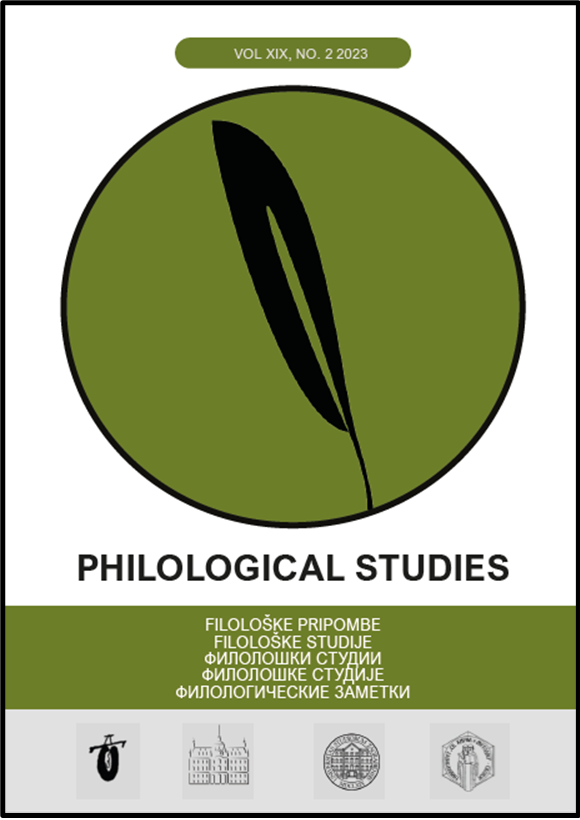THE SOCIO-HISTORICAL AND TECHNOLOGICAL CONDITIONS OF THE ORIGIN OF THE SCIENCE FICTION GENRE
Клучни зборови:
Science fiction, genre, literature, film, media, socio-historical context, changes, technologyАпстракт
The science fiction genre in all types of media is often neglected in the serious discussion of the scientific public. According to the established opinion, its origin is connected with the writings of Jules Verne and Herbert George Wells at the end of the 19th century, and it is often not seriously analyzed from the perspective of social influence. However, the science fiction genre arises as a response to the great social changes of industrialization and the development of new technologies, showing the possibilities of development ass well as the new moral, psychological and social problems that accompany technological development. With the advent of film, and especially television, the genre gained in expressive power by dealing with some of the very complex and significant social problems of modern society through the prism of fiction.
The aim of the paper is to point out the social conditions of its origin and development through a historical presentation of some of the most significant works of science fiction in literature and film. The paper presents and analyzes the works of Verne, Wells, Asimov, Clarke, Čapek, but also large television and film series such as Star Trek. It has been determined that social circumstances, progress of scientific thought and technology highly influenced the development of this genre.
Превземања
Референци
Преземања
Објавено
Издание
Секција
Дозвола
Авторите во списанието претставуваат оригинални дела врз основа на резултатите од сопственото истражување. Лицата кои дале значителен придонес во трудот се наведуваат како коавтори. Заедно со статијата, авторите (и коавторите, доколку ги има) треба да достават пополнет образец за пријава на трудот (Paper Submission Form), со кој се потврдува согласноста на авторот за објавување на трудот.
Списанието прифаќа научни трудови кои претходно не биле објавени. Не се прифаќаат трудови кои во голема мера ги повторуваат претходно објавените трудови на авторите. Повторувањето подразбира и компилација – текст составен од фрагменти од објавена монографија или голем број на претходно објавени статии. Плагијатот не е дозволен, како и прекумерното цитирање на туѓи трудови (една третина или повеќе од целиот труд). Сите цитати, цитирани извадоци и материјали мора да имаат цитирани автори и извори. Ако уделот на туѓиот труд е преголем, се препорачува да се скратат цитатите и да се зголеми обемот на оригиналниот текст.
Авторот треба да ги има сите потребни дозволи за користење на позајмените материјали и материјалите на други автори што ги користи во својот труд (илустрации и слично). Авторот гарантира дека статијата не содржи информации што не подлежат на објавување во отворен печат, вклучувајќи ги и оние што содржат или претставуваат доверливи информации.
Во списокот на литературата се вклучени само делата цитирани во трудот, како и линковите за страниците и изворите од кои е цитирано доколку станува збор за извори од интернет. На авторот му се препорачува да ги наведе во текстот изворите на финансиска поддршка на спроведените истражувања и стипендиите, доколку ги имало. Исто така, може да се изрази благодарност и до колегите кои придонеле или помогнале околу работата на текстот, а кои не се коавтори.
Со доставувањето на ракописот и образецот на апликација до редакцијата, авторот официјално се согласува со објавувањето на неговиот труд во „Филолошки студии“. Авторите се носители на авторски права и ги задржуваат сите права за објавување и користење на статијата. Авторите имаат право да ја повлечат статијата во кое било време до моментот на објавување на сајтот, со тоа што претходно за тоа, по писмен пат, треба да ја известат редакцијата на списанието.
Статиите се објавуваат бесплатно. Содржината е достапна под лиценцијата Creative Commons Attribution-Noncommercial-No Derivative Works 3.0 Unported License.
Издавачка Етика
Редакција
Сите трудови доставени до Редакцијата ги читаат прво нејзините членови и соработници за да се утврди дали се однесуваат тие на релевантната проблематика и дали одговараат на форматот на списанието. Редакцијата на „Филолошки студии“ гарантира дека разгледувањето на доставените трудови и нивните рецензии не зависат од: комерцијални интереси, пол, националност, верски убедувања, политички ставови и други фактори. Единствениот критериум при изборот е академското ниво на трудот.
Во зависност од рецензијата, статијата може веднаш да се прати за објавување, да биде отфрлена или испратена до авторот за измена и за доработка. Во случај на несогласување со забелешките на рецензентот, авторот има право да ги оправда своите ставови. Доколку од рецензентите се добиени контрадикторни мислења, текстот се упатува на трет рецензент или конечната одлука се заснова на гласање на членовите на Редакцијата, по одделното разгледување.
Рецензенти
Статиите испратени до Редакцијата минуваат процес на двојно анонимно рецензирање. Имињата на рецензентите не треба да му бидат познати на авторот на статијата и обратно. Рокот за рецензирање е три-четири седмици. Рецензентите можат да бидат членови на Редакцијата и автори на списанието што објавувале претходно во него. Онаму каде што е неопходно, за рецензенти се назначуваат специјалисти од други: организации, градови и земји.
Рецензентите треба да бидат специјалисти за предметно-тематската област на која се однесува статијата. Редакцијата треба да спречи каков било судир на интереси во врска со дадениот научен труд и со неговиот автор.
Рецензентот е должен да им обрне внимание на членовите на Редакцијата за секоја суштинска сличност или поистоветување меѓу ракописот што се рецензира и која било друга публикација што му е позната. Рецензентот, исто така, е должен да го држи во тајност трудот што му е доверен, да не го пренесува на трети лица ракописот што му е доверен нему за рецензија и пред објавувањето на публикацијата да не ги објавува информациите содржани во него.
Рецензентите треба да дадат објективна, непристрасна и аргументирана процена на трудот. Забелешките треба да бидат формулирани коректно, така што оценувањето на трудот се однесува само на текстот на статијата и на неговата содржина. Рецензијата треба да биде напишана добронамерно, а наведените забелешки имаат за цел да им помогнат на авторите да ги коригираат утврдените недостатоци и да ја подобрат статијата пред да биде објавена таа на веб-страницата на издавачот и пред да биде достапна за пошироката публика.


